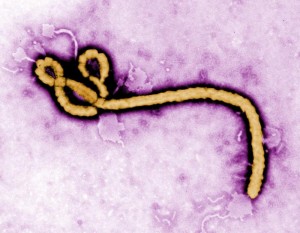Unprecedented international consortium assembled to accelerate collaborative multi-site trials of candidate Ebola vaccine

A candidate Ebola vaccine could be given to healthy volunteers in the UK, The Gambia and Mali as early as September, as part of an series of safety trials of potential vaccines aimed at preventing the disease that has killed more than 1,400 people in the current outbreak in West Africa.
Human trials of this candidate vaccine, being co-developed by the US National Institutes of Health (NIH) and GlaxoSmithKline, are to be accelerated with funding from an international consortium in response to the Ebola epidemic, which the World Health Organisation recently declared a public health emergency of international concern.
A £2.8 million grant from the Wellcome Trust, the Medical Research Council (MRC) and the UK Department for International Development (DFID) will allow a team led by Professor Adrian Hill, of the Jenner Institute at the University of Oxford, to start safety tests of the vaccine alongside similar trials in the US run by the National Institute of Allergy and Infectious Diseases (NIAID, a part of the NIH).
The phase 1 trials will begin as soon as they receive ethical and regulatory approvals, which will be considered on an expedited basis. If approvals are granted, the UK research teams could start vaccinating volunteers from mid-September.
The consortium’s funding will also enable GSK to begin manufacturing up to around 10,000 additional doses of the vaccine at the same time as the initial clinical trials, so that if the trials are successful stocks could then be made available immediately by GSK to the WHO to create an emergency immunisation programme for high-risk communities.
The candidate vaccine is against the Zaire species of Ebola, which is the one circulating in West Africa, and uses a single Ebola virus protein to generate an immune response. As it does not contain infectious virus material, it cannot cause a person who is vaccinated to become infected with Ebola. Pre-clinical research by the NIH and Okairos, a biotechnology company acquired last year by GSK, has indicated that it provides promising protection in non-human primates exposed to Ebola without significant adverse effects.
Safety trials with small groups of healthy volunteers are now required to ensure that the vaccine does not cause unforeseen side effects, and that it generates a good immune response to Ebola in humans, before it can be rolled out to larger at-risk populations, even on an experimental basis.
To accelerate these trials, the NIH has generously agreed to provide the NIAID/GSK Ebola vaccine for safety studies led by the Oxford team, which will run in parallel to its own trials. Oxford’s Jenner Institute has extensive experience of clinical trials of similar vaccines, which they have evaluated clinically for six other diseases in Europe and Africa.
If the first volunteers vaccinated in the Oxford study show a good response with no adverse reactions, the trial will, after approval from the relevant authorities, be extended to volunteers at the MRC Unit in The Gambia. A second West African arm of the study, led by Professor Myron M. Levine of the Center for Vaccine Development at the University of Maryland School of Medicine, and Professor Samba Sow of the Center for Vaccine Development in Mali (a joint initiative between the University of Maryland School of Medicine and the Ministry of Health of Mali), will then begin in Bamako, Mali.
The Oxford study will involve 60 healthy volunteers, while those in The Gambia and Mali will each involve 40. Each set of volunteers will be split into groups of 20 that will receive different doses of the vaccine so researchers can evaluate the best dose to use in terms of both safety and activity.
NIAID are testing this same vaccine in the US, in addition to a related vaccine that is designed to protect against two Ebola species (Ebola Zaire and Ebola Sudan).
This collaborative multi-trial approach will help ensure the fastest possible progress to determining the best candidate vaccine approach and delivery. The addition of West African arms will also ensure that the studies take account of differences between European and West African populations that might affect safety or immune response.
It is hoped that the phase 1 trials might be finished by the end of 2014, after which deployment of the vaccine could be fast-tracked should it prove to be safe and immunogenic.


One thought on “Ebola vaccine human trials could begin in September”